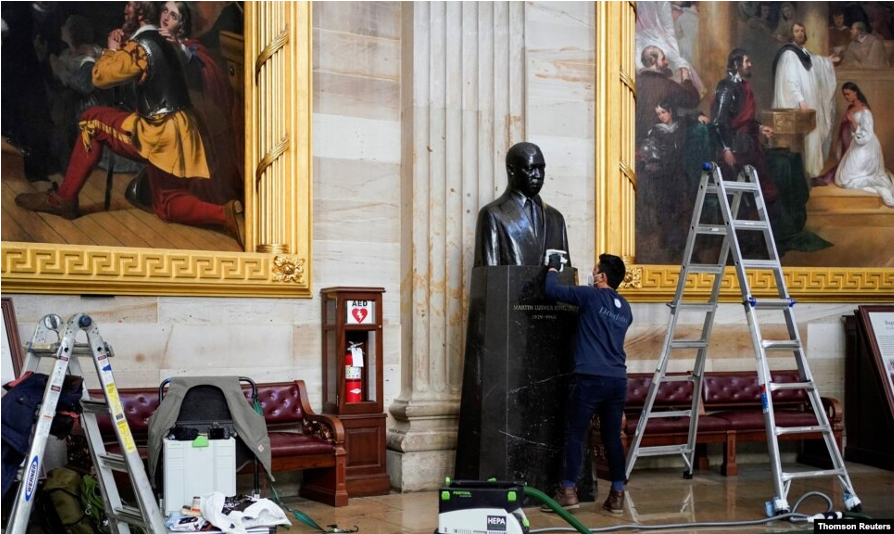
I was not going to watch Master Gardener, because the trailer made it look like a boring action film. But then I wondered whether it might be interesting in relation with my research on ecofascism. In this aspect, the film did not disappoint. When I looked up the film reviews afterwards, critics did not touch on this theme at all. Instead they accused director Paul Schrader of three things: being a ‘one-trick pony’ (focusing on the redemption of troubled men for the last 50 years), using an unrealistic storyline, and off-screen ranting against ‘wokeness’. The film was considered schematic and untimely. I had not watched anything by the director, apart from American Gigolo (1980) many years ago, so I cannot comment on the patterns, but I felt that some of the social observations expressed in Master Gardener were more sharp and subtle than a lot of other well-intentioned white attempts to address racism. Here, I disagree with many critics that the material was in the wrong hands. I also do not agree that the film was boring, or that it had a slow pace (I really needed to go to the toilet during the film, and it was difficult to find a moment where I felt I wouldn’t miss out on an essential part of the film). Rather, it feels as if Schrader addresses some of the power dynamics to which he seems to be oblivious in real life.
Master Gardener is part of a trilogy, together with First Reformed (2017) and The Card Counter (2021), that Schrader describes as ‘men writing a diary’. Like First Reformed, the film takes on the ecology-society relation, though in a different way. Where First Reformed is about a priest who realises that religious organisations have a hand in destroying the planet, Master Gardener is a story about the desire for order, and how ideas about order underly toxic social structures such as racism, sexism, queerphobia etc. The director was apparently inspired by a gardening programme that made him realise that ‘most people think of gardening as life-enhancing, nourishing, beauty-enhancing, but it’s also full of violence – cutting, pruning, weeding, deadheading … Gardening is a kind of eugenics’ (Another Mag). The film starts with the phrase ‘gardening is a belief in the future – a belief that things will unfold according to plan’. This phrase hit me rather hard, given that a close friend – a devoted gardener – had taken his own life the weekend before. The phrase rang untrue, and I felt that the voice of the main character carried a heaviness. He seemed to utter the sentence like a mantra, as if he needed to hold on to this belief.

The setting of the garden is a mansion, owned by the wealthy Norma (Sigourney Weaver). Its style implies that it is a former plantation (the film was shot at Rosedown and Greenwood Plantations). Norma has servants who take care of her, and gardeneres who take care of her formal garden which also functions as a venue for gardening shows. The garden, despite the cameraderie amongst the staff and mundane routines through which it is tended, feels like an uncomfortable environment. The imposition of geometric forms on plant life seems to echo the on-going attachment to inherited slave owner wealth, aesthetics and related power dynamics. The gardener in charge is Narvel Roth (Joel Edgerton), who is introduced as an earnest man who fills his diary with philosophical thoughts about human-nature relations. It is later revealed that he is a former neo-Nazi who went undercover as part of a witness protection programme. The film documents his evolving relation with nature, possibly guided by Norma’s tutelage (they are also lovers). While still a neo-Nazi, Narvel was no stranger to gardening philosophies, believing his group leader that the far right are like a gardeners who ‘pull out the weeds’. In the present, he tries to combine his identification with the ordering drive of European natural history with a holistic narrative about healing. In one scene, for example, he gets his apprentices to smell the soil to connect to the ‘mineral, animal, vegetal’; in another, he mourns that people only connect to the soil with soles and not skin. His commentary hovers between the imagery of ‘blood and soil’ and a transcendence of this attitude, showing the uncomfortable closeness of ideas. It reflects the creepy comfort of racism, through its illusion of tending an otherwise disorientated nature. Narvel’s new routine is disrupted by the arrival of Maya (Quintessa Swindell), Norma’s ‘troubled’ mixed-race grand-niece, who was invited by Norma to start a paid gardening apprenticeship.
On the surface, the plot and some of the stylistic tools feel overly didactic and two-dimensional: the rich woman having an affair with her edgy gardener; rich people performing transactional forms of relation; the ‘expulsion from paradise’ theme; the black relative being a drug addict whom a white woman wants to ‘civilise’; two-dimensional drug dealers and ‘hood’ representations; the drug withdrawal mentorship; the racist being redeemed though his acceptance by and affection for a black woman. These tropes are indeed dumb and outdated, if they were to be realistic. On a metaphorical level, and in combination, they make a lot more sense.

Apart from the soil theme, there are two other images in the film that I appreciated. The first one is the easy-but-uneasy ‘return to the garden’. After suspecting an attraction between Maya and Narvel, the jealous Norma kicks both of them out. Within the same day, the two of them end up on a road trip dealing with both Maya’s and Narvel’s demons (Maya’s addiction and violent home environment; Narvel’s racist/murderous past). After a tense resolution, they return as a couple, but find the garden vandalised by Maya’s former drug dealers. Narvel makes an offer to Norma to get the garden back up for the following year (‘Plants rejuvenate – that’s what they do.’), but under the condition that him and Maya get to stay on the premises as a married couple. Norma grudgingly agrees, and the closing scene shows Maya and Narvel slowly dancing on the porch of Narvel’s former cabin. The image could be interpreted as a ‘return to paradise’, but it actually feels more like a return to another oppressive space, especially with the marriage (= property relation) and cabin imagery thrown in, and the spatial limitations of their dance. Since the ‘outside world’ is portrayed as an even more hostile environment (racism, drugs, dubious policing), married life in the garden perhaps becomes an opportunity, a space where at least some control can be exerted on a hostile environment. There seems no point making an intervention in the world beyond – it seems impossible to succeed against such entrenched dynamics, so the aspiration can only ever be partial containment. The garden thus becomes Maya’s and Narvel’s safe space, without ever having been a safe space for people like Maya (whose dad is African) or even Narvel (by association with Maya) in the past – or without ever truly becoming one in the present (it is more like a contained microcosm of the outside world). The outside world will always crash in, as will natural hazards. As another gardener counters Narvel’s determinist view on ordering: ‘you cannot spreadsheet nature – it will always surprise you’. This is not just in the good sense – Narvel’s transformation against all odds – but also in a portending sense. Here, the film is not actually an optimistic redemption story, as it has been frequently read. The kitsch ‘redemption moment’ – a magical realist rupture featuring flowers blooming in the night – feels far too satirical for that.

Even Maya’s and Narvel’s relationship feels uncomfortable despite the apparent mutual healing. For me, this is not for obvious reasons such as age difference, race or ‘Lolita’ complex (Narvel has a daughter he can never meet again who could be close to Maya’s age), but for the fact that Maya interacts with Narvel in very much the same way as her great-aunt (intimate scenes with both Norma and Maya carry resonances of slave markets, with the abject Narvel being the one inspected). This leads me to the second image, which I find even more powerful: the intersection of race, racism and class, represented in the Norma-Maya-Narvel triangle. Not only does Maya represent a class ambiguity for many (her mum is considered ‘fallen’ upper class, because of her drug addiction; her dad is not considered upper class, solely because he is Black), but she deliberately performs these ambiguities with different people (e.g. passing for upper class to get drugs to wealthy clients, passing as poor in a poor neighbourhood, though ultimately breaking with this environment at the end). Class also matters in the racism performed by Narvel and by Norma. While Narvel and his friends are the obvious racists or ex-racists, the wealthy or middle class white people in the film make ‘acceptable’ racist assumptions, and continue to uphold and benefit from racist infrastructure. As in real life, everyone’s eyes are on the raging people of the Capitol Riot, but not on the colonial paintings that surrounded them in the building – the acceptable racism of official genocide. Even when media commentary focuses on the Black and Latino workers who cleaned up the mess, the fact that the structure itself is infused with racism, and thus enabling the comfort of Nazis within the structure, is carefully ignored. In the film, this quiet racism is also represented through visual details: the jellyfish wallpaper on Norma’s mansion walls that echo the drawings of German eugenicist naturalist Ernst Haeckel, Norma’s shirt pattern depicting sailing ropes and anchor prints.
If one looks back at the anti-woke comments by the director, one might also wonder about a potential commentary on white Americans feeling disenfranchised by a rising Black middle/upper class that has a growing influence on US and global culture. In the past, such anxieties have led to horrific events such as the Tulsa Race Massacre in 1921. At the 100th anniversary commemorations of the event, speakers drew troubling parallels with the present. In the film, it is not just Narvel’s past self that felt threatened, but also Norma. Although she wants Maya to inherit the estate, to keep it in the family, she wants this to happen under very specific conditions. Once this does not work out, Norma abandons the plan. This image seems to reflect the author’s own reactions about potential disenfranchisement by ‘political correctness’. There is another scene the dubious witness protection officer working with Narvel appears wearing a ‘We should all be feminists’ shirt, which could be seen as a more obvious jab. This contrasts with the more subtle analysis in the film. Although expressed through clichés, it queers these to ultimately arrive at an uneasy parable. Here, the director might be the one seeking redemption himself.












